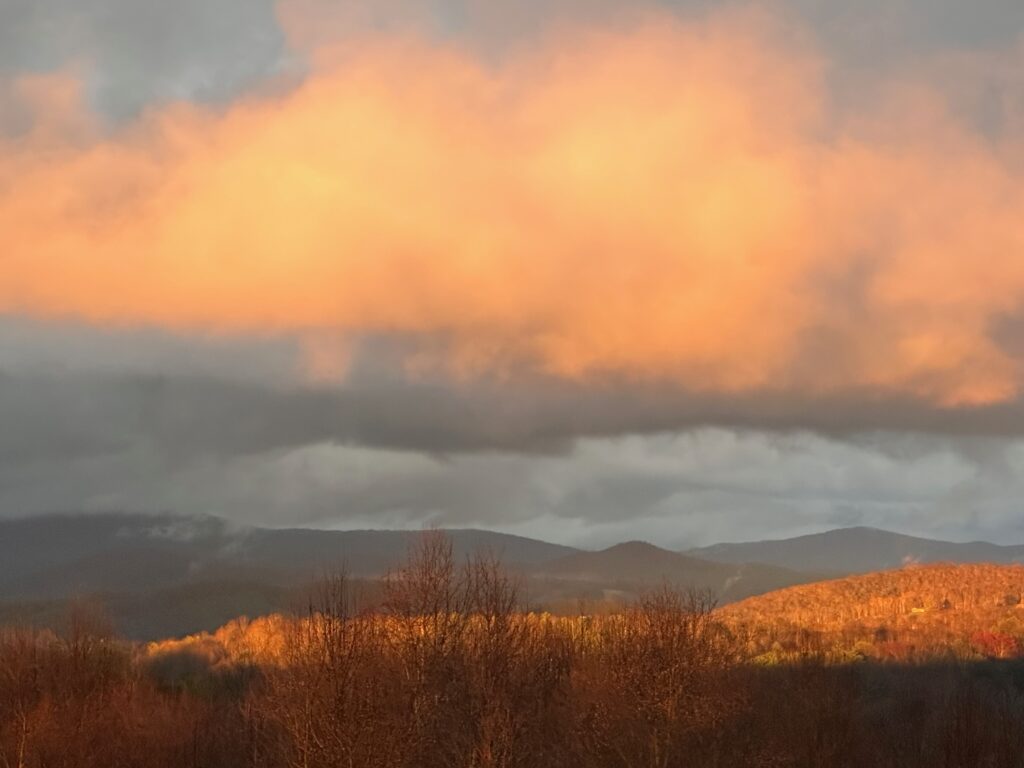Jeff Garrison
Bluemont and Mayberry Church
November 20, 2022
The Lord’s Prayer, Part 6
At the beginning of worship:
Two weeks ago, at Mayberry Church, we held a training event titled “Centered and Soaring.” This event was sponsored with partnership funds from the Presbytery of the Peaks. Those there were provided several “take-away ideas” to strengthen our discipleship as a follower of Jesus. One take-away was a Prayer Covenant. The idea is that we join with another individual to pray for each other for a specific time. Sometimes the prayers may be general, other times they may be more specific, as when we need help in a particular area.
Jesus wants us to pray for each other
When Christians pray for one another, we’re doing what Jesus teaches in the Lord’s prayer. This is not a prayer about us as individuals. It’s about us in community. Consider the words: “Our Father, Give us, Forgive us, Lead us not, Save us…” There is no “Me” in the prayer. It’s all about community and for that reason, we need to be praying for one another.
This will be our six and final Sunday focusing on the Lord’s Prayer. I have never preached a series on Jesus’ prayer and in a way am sad that it’s coming to an end. There is so much more that I would like to say. This prayer is steeped in our tradition. As Matthew’s version of the prayer reminds us, we’re to use this prayer as a model or template for our own prayers.
Lord’s prayer as a template
At the Presbytery meeting this past Thursday at Second Presbyterian in Roanoke, our moderator modelled this. She didn’t say she had written a prayer based on the Lord’s prayer, but as I listened, I could pick out the various petitions of the Jesus’ prayer. When you need to pray and are lost for words, you might consider the parts of the Lord’s prayer. And, to reiterate, if we find a lot of “Me’s” or “mine’s” in our prayers, we should compare how we pray to how Jesus teaches us to pray.
Before the reading of Scripture:
While I didn’t watch Jeopardy this week (which is nothing new), I heard about it. One of the questions in a championship round had to do with which epistle of Paul’s had the most Old Testament references. According to Jeopardy, the right answer was Hebrews. I didn’t realize so many familiar with the Bible watched Jeopardy, for immediately Facebook and Twitter blew up with people pointing out Jeopardy’s mistakes. For nowhere does Hebrews tell us that Paul was the author and there are some who question labelling it an epistle as it’s more of a sermon than a letter. And finally, Romans appears to have more links to the Old Testament than Hebrews. They got it wrong on many levels.[1]Hold that thought, I’ll come back to it in a moment.
Petitions in the Lord’s Prayer: A Bit of Jeopardy-like trivia
Today we’re looking at our last petition in the Lord’s Prayer: “lead us not into temptation but deliver us from evil.” I noted in one of my earlier sermons that while we tend to consider the prayer to have six petitions,[2] there are some who divide it into seven. To do this, they split the last petition into two separate parts, one on temptation and one on the evil one. You can find this in Luther’s Catechism[3] as well as the catechisms of the Catholic Church.[4]One of the reasons for making this prayer into seven petitions instead of six is that it seven is consider a perfect number.[5]
This kind of trivia might do you well if you find yourself on Jeopardy. Of course, you’ll have to guess which source their experts consulted as to if there are six or seven petitions in this prayer.
Read Matthew 6:9-13
I recently spent a lot of time with John Bunyan’s classic, Pilgrim’s Progress.[6] I had read parts of it before, but never spent much time studying the book until a theology group of which I am a member decided to study it. In preparation, not only did I read the book, I also read a commentary on it and also reviewed books on Puritanism which I had read decades ago.
Popularity of Pilgrim’s Progress in 19th Century America
I had looked forward to delving into this work of Bunyan. I had known for some time that Pilgrim’s Progress was the second most popular book in the 19th Century for those moving into the American West. On wagon trains and clipper ships, the Bible was the number one book people had in their possessions. If they had a second book, unless you were Samuel Clemens, the book was most often Pilgrim’s Progress. Clemens, better known as Mark Twain, wrote a humorous piece about hauling a dictionary across the continent.[7]
Christian’s journey
Pilgrim’s Progress begins with the story of Christian, who becomes convicted the city in which he lives (aptly named “Destruction”) is about to be destroyed. No one wants to listen to him talk about what’s to happen. He’s mocked by friends and family. So, he decides to flee. He leaves on a pilgrimage to the Celestial City, to God’s kingdom. While he abandons his family, he begins his trip with two friends. But they quickly leave him. His travels are often solo or with just one companion, such as Faithful, who is martyred along the way…
Obstacles to overcome
Christian must overcome many obstacles to reach God’s kingdom. In the second half of the book, Christian’s wife Christina and his children make their way to the city, following Christian’s example. Unlike Christian, who is often alone, they travel in a group and while they have their own trials, they make the journey with less trouble than their father, who has become an encouragement to other pilgrims.
The reader of Pilgrim’s Progress comes away with the impression the Christian life is one of constant challenges and temptations. Nothing is easy about the pilgrim’s journey, but the hope of the eternal city keeps the pilgrim moving forward and making the right decisions.
Pilgrim’s Progress and the ending petition
The ending of the Lord’s Prayer captures Pilgrim’s plight. “Lead us not into temptation but deliver us from evil.” The language here is stark. Deliver us could also be “snatch us”[8] as if we’re about to walk off a cliff. Metaphorically that’s what we’re about to do when evil confronts us.
Early in his pilgrimage, Christian is caught in the Slough of Despond. In this prayer, temptation is the pit or slough where we find ourselves stuck when caught in sin. And the evil one is the power that draws us into the pit.[9]
Evil forces in the world
This prayer reminds us that there are forces in the world who challenge us and seek to keep us from faithfully following Jesus. And prayer challenges those powers. As Karl Barth, the great 20th Century theologian, said, “To clasp hands in prayer is the beginning of an uprising against the disorder of the world.”[10]
Prayer is where we start. Before we do anything else, we need to be sure we are on God’s side. This prayer helps us do because it refocuses us, away from our petty concerns, and toward God. Before we set out to save the world, which isn’t our job by the way, we should pray. We pray because we see dimly in this world,[11] and we need God to light or direct our way.
Subtle temptations
Temptations can be so subtle. Often temptations are good gifts but are not used in the manner intended. When anything moves between us and God, the good is tainted. And the evil one knows this, which is why he makes temptations seductive. So, we ask God to help us as we navigate this life. We only have glimpses of the holy, of God’s plan and glory. But we move forward, through the fog, in faith, praying and holding out to the hope we have in Jesus.
Lack of community
One of the things that struck me in my recent study of Pilgrim’s Progress was the lack of community.[12] Christian is often on his own. I’m afraid this aspect of Bunyan’s book has been detrimental on American Christianity. The book’s popularity in our early history tempted the church to deemphasize community over the individual.
A theologian friend of mine has suggested the Achilles tendon of the Reformed Tradition is our lack of understanding of ecclesiology.[13] That is, by focusing on the individual, we don’t have a good understanding of the church and how it is to help us grow disciples. This over-emphasis on the individual may stretch back to the Puritans, of which John Bunyan was one. But in Scripture, as we see in this prayer, the focus is most often on the community. We need to regain a sense of how the Christian community works to draw us closer to Christ.
Lord’s Prayer is based on community
The Lord’s prayer is not about the individual. It always pulls us from our individual concerns to the concerns of others. We don’t pray, “Save me,” but “Save us.” The community, the church, is to be there to help us when we falter along the way. While we look for God’s guidance as we are tempted or challenged by evil, we are also to be supported by other godly people. We have two hands and should hold God in one and God’s people in the other.
It is interesting that Jesus’ begins his prayers with a focus on God as Father, and ends this prayer on a downer, talking about the evil or the “evil one.” We can give him a name, “Satan.” Perhaps this why a doxology is added onto the prayer. However, as we see, most Bibles don’t have this doxology. If you’ve worshipped in a Catholic Church you’ll know they don’t say it. I found this out the hard way when I was a student pastor and participating at a Thanksgiving service at St. Mary’s of the Mountain Catholic Church in Virginia City. I continued to pray, along with a handful of Presbyterians, while the rest of the congregation ended their prayer early.
Ending doxology
The doxology was found in texts dated to around the 10thCentury.[14] It’s found in the King James Version, but even then, it was known that this passage may not have been original. John Calvin admits such in his writings.[15] Today, as it is not found in any of the older manuscripts, translations leave out the doxology. However, thanks to the King James Version, the phrase has been adopted by us liturgically. After all, who wants to end a prayer with the focus on Satan?
Why might this doxology have been added? One suggestion is that the prayer ends so ruggedly so we might continue with our own prayers. This is kind of like how I write my pastoral prayers. Generally, on Sunday mornings, as I watch a new day emerge out of the darkness, I write a paragraph or two. Then, we when we come to the prayer, based on shared joys and concerns and how I’m feeling, I finish praying “off the cuff.”
In favor of the doxology
Personally, I don’t think we should get rid of the doxology even though it’s not in scripture. Instead, it concludes this prayer in a “shout out” to Almighty God: thine is the kingdom, the power, and the glory.[16] But if you want to pray the prayer as it is found in the gospels, do so and tack your own prayers of praise at the end.
Conclusion
I hope you have learned something about prayer over the past six weeks. If I was to quickly summarize the highlights of this prayer of Jesus, I’d say it focuses us on God, on our necessities and the necessities of others, and to our need for God’s protection and the fellowship with other believers. Amen.
[1] This is the example of one such article to come out of Jeopardy-gate: https://www.thegospelcoalition.org/article/jeopardy-paul-hebrews/
[2] Both the Heidelberg and Westminster Catechisms have six petitions. These are found in the Presbyterian Church USA, The Book of Confessions (Louisville, KY: Office of the General Assembly, 2018). The same is true for John Calvin, Institutes of the Christian Religion (1559, Ford Lewis Battles translation), III xx.
[3] Martin Luther, “Large Catechism,” Book of Concord: The Confessions of the Evangelical Lutheran Church (Philadelphia: Fortress Press, 1959), 433-435
[4] See https://www.usccb.org/sites/default/files/flipbooks/catechism/686/
[5] The Greek early Church fathers mostly divided the prayer into six (two sets of three, and Matthew often uses sets of three in his gospel). However, Augustine along with Lutherans and Catholics use the “perfect” seven sets. Fredrick Dale Bruner, The Christbook: Matthew 1-12 (Grand Rapids: Eerdman, 2004), 293.
[6] In addition to reading Pilgrim’s Progress and listening to it on Audible, I also read Robert Maguire, D.D., Commentary on John Bunyan’s “The Pilgrim’s Progress” (1863, Minneapolis, MN: Curiosmith, 2009).
[7] Mark Twain, Roughing It (1871: Berkeley, CA: University of California Press, 1993), 18-19.
[8] Bruner, 314
[9] Bruner, 314.
[10] As quoted by William H. Willimon and Stanley Hauerwas, Lord, Teach US: The Lord’s Prayer & the Christian Life (Nashville, TN: Abingdon, 1996), 109.
[11] 1 Corinthians 13:12.
[12] My other concern is the apparent lack of grace that is seen in Pilgrim’s Progress.
[13] Ecclesiology is the study of the church. Dr. Jack Stewart, formerly a professor at Princeton Theological Seminary, and I have discussed this several times. As a scholar of Charles Hodge, Stewart points out that Hodge had planned but never completed a fourth volume of his systematic theology that would have been on ecclesiology.
[14] Alister McGrath, In the Beginning: The Story of the King James Bible and How it Changed a Nation, a Language, and a Culture (New York: Anchor Books, 2001), 242, 244.
[15] Calvin, Institutes, III xx 47.
[16] Willimon and Hauerwas, 98.






